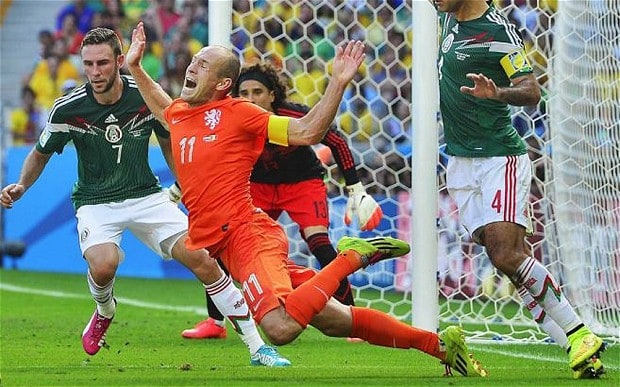Football’s real origins derive from the late 1800’s, when the first Football Association was created in 1863. Before this, due to the popularity of the sport in public schools, Cambridge took it upon themselves to create a group to design a new blueprint for the game; outlining some of the very first inaugural rules of the game, to make it more civilised than it was for the middle class previously. Over a decade on the new found Football Association created a more official rule book of the sport in a more competitive manner. In this article, VAVEL shall discuss the many aspects of the game that have shaped its current situation and changed it forever.
The rules of the game
Many young people may not be aware of the complete origins of football right back to that day in 1863, which means that they are unaware of the many rules that have been adapted, due to the necessary requirements of the sport as it developed to make it a quicker, fairer, and more exciting game for both the players and the fans. One of the rules that has been scrutinised for decades is the “offside rule”.
The rule, today, is known as: the striker cannot be goal side of the last defender when the ball is struck in the process of it being passed to him. However, this rule was much different when the first official laws were put to practice in 1863, as any attacker ahead of the ball was deemed offside. This meant that players would more often run with the ball or would have to play it backwards or sideways, which certainly made the game slow and quite boring. This then altered so that the attackers would only be offside if they were ahead of the third-last defender, enabling more offensive passing to develop into the sport; something that fans behold as a wonderful skill to witness at its best in the modern game. The ultimate change led to the current rule that you cannot be beyond the last defender when the ball is played to you, which again allowed greater chance for a better range of passing football to grow into the prestigious sport.
Gradually, more and more features of the game that we love today were introduced, such as goal kicks in 1869 and corner-kicks in 1978; which would mean more pressure on teams to keep the ball in play and keep the game in motion. Also, introductions of these set-pieces meant that more skills and tactics had to be learnt by teams in order to play successfully. This also brought about a new spectacle for the fans, as they could see a new way that teams could compete in defending and scoring goals.
Furthermore, the sport was previously very violent, middle-class games were known to lead to conflict and subsequently fights, due to a lack of an authority figure. Previously, until referees were introduced, the two captains from either side had to settle the dispute. When the new laws were announced, the game became more of a gentleman’s sport.
More growth occurred, in terms of officiating games, before the current laws of referee’s linesmen and the 4th official were introduced. For example, by the time the first FA Cup and international fixtures commenced, the two teams would have one referee each of whom they would appeal decisions to. However, this caused lengthy delays and would seem very boring for enthusiastic crowds. In present-day football, there is now one referee who makes all the final decisions in the match, while supported by the 2 linesmen (one in either half) to help with offside decisions, and any other situation in the match that the referee may not have seen. This in the modern game helps make the game as fair as possible and ensures that decisions are more likely to be made correctly in in-game situations.
In the past five years, there has been the introduction of two more officials, who are responsible for managing the goal line, and ensuring correct decisions when it came to goal line controversy. Many fans, however, believe they are a waste of time, due to the fact that they cannot influence a greater range of decisions inside the area. Subsequently, the debate raged on about the development of goal line technology and finally, with the help of the huge funding capacity of the football governing bodies, it was introduced in the 2013/14 season. This breakthrough has certainly had a positive impact on the quality of officiating in the modern game – of which undoubtedly technology was going to have to come into play due to the increased pace of the game.
One major rule that has had a exponential impact on the tactics and fluency of football is the no back-pass rule, which was altered for the 1990 World Cup by the governing body FIFA; as no goalkeeper could then pick the ball up after receiving it from a teammate intentionally. This meant that teams could no longer repeatedly passing the ball to the keeper, who could not be disrupted by forwards when the ball is in their hands. Furthermore, the new rule made goalkeepers have to develop ball skills like any other outfield player, to a degree, and made sure that the ball was always in play and available for the opposition to seize.
Overall, the adaptations to the rules of this wonderful sport have certainly shaped it into one of if not the best sport in the World today due to its new exciting, free flowing, competitive style that fans cannot get enough of across the globe.
Technology and the Media
There are a multitude of factors that have made football one of the richest sports around and the most viewed Worldwide.
Firstly, television is a major piece of technology that has certainly allowed millions of football fans to see their beloved teams play all season long. All the major World competitions such as the World Cup, the European Championship, Champions League are also being shown on terrestrial television. The first live game was aired in 1937 when televisions were a rare asset to households across the UK and globally. One year later, the recently formed BBC (British Broadcasting Company) began to air live football from the international stage as well as the foremost prestigious competition in England: the FA Cup.
Since then, live football has exploded onto television screens due to the World’s major broadcasting companies such as Sky Sports, ITV and the BBC (which are more prominent in the UK). Furthermore, due to this increased TV coverage, the company’s camera teams have to operate within each ground of the clubs that are being broadcast, meaning that the clubs receive TV rights from each fixture broadcast.
In addition, before the internet, no fan globally could really access news about their favourite teams, as newspapers were local to their own country. However, now the internet is booming with activity in regards to professional and amateur news sites, club websites and more, which means that fans across the world can get close and up to date with the news from their favourite leagues and clubs. This can further increase club revenue due to increased worldwide merchandise sales. In 2008, ¼ of Arsenal’s total revenue came from merchandise sales, hitting over £40 million, which surely would have been less without the name being famous in many other nations.
Overall, the major increase development in media has allowed the beautiful game to spread like wildfire across the world, increasing the spread of news; game coverage and merchandise sales; increasing a team’s income exponentially, especially the biggest clubs such as Arsenal, Manchester United, Barcelona and many more giants of the game.
Furthermore, since the mass expansion of the game, the global franchises and businesses within the sport and football community have heavily invested in lucrative sponsorship deals. These aid the clubs, and the individual players earn a lot more extra money; as long as they aid them in their advertising schemes. For example, multinational sports corporations Adidas, Nike, Puma and many more, are the kit sponsors that work with the football clubs to design kits for the new seasons (which in itself create massive revenue due to the sales of new kits every year), provide boots for players and more.
It is not only sport businesses that can negotiate sponsorship deals, but many global franchises from food, to betting and travel; further increasing the financial input to clubs, again as long as they share the name of the company and promote it by wearing it on their kits, naming stadiums and more.
However, this has caused some serious controversy for some teams who have gone down this route. For Arsenal FC, the transition was easy as they moved from the old legendary stadium of Highbury to a new, modern stadium, which was named after their leading sponsor Fly Emirates. However, Newcastle United's stadium name change did not go down well with the Toon faithful, as their beloved St James’ Park, a historical name for a stadium of a team with a very passionate and loyal fanbase, became the Sports Direct Arena.
Overall, despite being controversial, sponsorship deals allow much more money to circulate within the financial system of football, leading to increased money spent on everything, from player pricing, wages, staff, facilities and more. Some of these expenses are argued to be a waste of money. Player wages and pricings of the modern stars of the game are seen as unnecessary ,which for most fans of the game will agree with. The average earnings of a top flight footballer in England is around £30,000 per week with the highest earners hitting £250,000 in the same time period – an exponential increase since the days when the professionals were much closer to the working class supporters that followed them. Also, some of the world's best players are hitting almost a 10th of a billion pounds in price and many more players are being seriously overpriced, simply because they can as this has been allowed by the huge financial input that the clubs get allowing them to spend, spend, spend. Due to the presence of billion pound owners, players are paid huge sums of money simply because they can. They are also what their fans come to games to see at the end of the day, and not the hard-working staff that help them to become the best they can be on the pitch.
Deviance
It seems that there is so much debate now around the topic of deviance, or what most fans would describe as 'cheating' in order to gain unfair advantages in matches, which we are seeing so much more regularly in the modern game.
For example, many players are receiving bad reputations for diving or ‘milking’ injuries on the field of play to win free-kicks; get opposition players sent off; or even top waste time for their team, so obvious to fans but not referees.
Players like Gareth Bale, Raheem Sterling and especially players from foreign leagues are notably guilty or have been in recent years, proving of this radical change. It may seem that the pressure of success and the financial gains of victory – especially in the games’ biggest tournaments, has driven many players to adopt this negative mentality which has to many, poisoned the sport on many levels.

In summary, since the origins of this wonderful sport, almost all aspects of the game have changed from: who manages the Global network of football; the size of the clubs involved in the biggest leagues in the world; the new found access for millions globally to watch their favourite teams and players from their television screens; the money circulating within it, and the size of the fan bases following the biggest and most famous clubs. These changes have had some wonderful, yet also controversial, effects on the beautiful game that fans will both love and resent. All we know is the changes have made it huge across the globe in every sense, and it is likely to head in the same direction for years to come.
Many thanks to www.bbc.co.uk, www.skysports.com, www.telegraph.co.uk, www.fifa.com and www.history.co.uk for facts, figures and images used in this article.









































